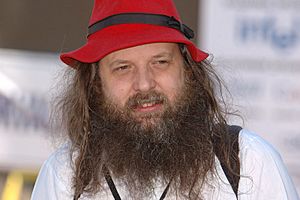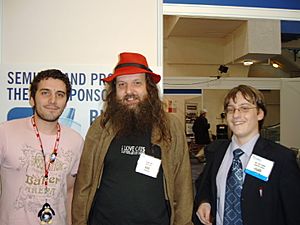Alan Cox facts for kids
Quick facts for kids
Alan Cox
|
|
|---|---|

Alan Cox at FOSS.IN/2005
|
|
| Born | 22 July 1968 |
| Nationality | British |
| Other names | ac |
| Alma mater | Swansea University |
| Occupation | Programmer |
| Spouse(s) | Telsa Gwynne (d. 2015) |
| Partner(s) | Tara Neale |
Alan Cox (born 22 July 1968) is a British computer programmer. He is well-known for his important work on Linux. Linux is a popular type of computer operating system, like Windows or macOS. Alan helped develop the core part of Linux, called the Linux kernel, starting way back in 1991.
He lives in Swansea, Wales. He studied Computer Science at Swansea University, getting his first degree in 1991. He also earned a business degree (an MBA) from the same university in 2005.
Contents
Alan Cox's Work on the Linux Kernel
While working at Swansea University, Alan Cox put an early version of Linux onto a computer. This computer was part of a busy network. This helped him find many problems, or "bugs," in the networking code. Alan fixed these bugs and even rewrote a lot of the networking system. Because of this, he became one of the main people who developed and looked after the entire Linux kernel.
He was in charge of a specific version of the Linux kernel called the "2.2 branch." He also had his own versions of the "2.4 branch," which were known for being very stable. These versions included fixes that were later added to other official Linux versions.
For a long time, many people saw Alan Cox as the second most important person in Linux development, right after Linus Torvalds (who created Linux). Later, Alan spent less time on Linux to focus on his business degree.
In 2009, Alan decided to step down from his role as the maintainer of the TTY layer. This was because he and Linus Torvalds had different ideas about how to fix a problem in that part of the system.
Alan worked for the Linux company Red Hat from 1999 to 2009. Later, in 2011, he joined Intel Corporation. He left Intel and Linux kernel work in 2013 to take care of his wife during a difficult time with her health. He returned to both later that year. He then retired at the end of 2019.
Besides Linux, Alan has also worked on other computer projects. These include GNOME and X.Org, which help create the look and feel of computer desktops. He also created AberMUD, an early online game, when he was a student.
Fuzix: A Small Operating System
In 2014, Alan Cox announced a new project called Fuzix OS. This is a very small operating system kernel, similar to the core of Linux, but much simpler. He joked about it, saying:
Fed up of SystemD?
Kdbus the final straw?
Linux community too large and noisy?
Yearn for the good old days when you knew every contributor by name and the source code fitted on a single floppy disc?
This shows his interest in creating efficient and simple software.
Alan Cox's Hobbies
Alan Cox also has a hobby business called Etched Pixels. This company makes kits for N gauge model trains.
Standing Up for Programming Freedom
Alan Cox strongly believes in "programming freedom." This means he thinks programmers should be free to create and share software without too many rules. He is openly against software patents, which are like patents for ideas in software. He also opposes laws like the DMCA.
He even resigned from a group called Usenix to show his protest. He also said he would not visit the United States because he was worried about being arrested. This was after another programmer, Dmitry Sklyarov, was arrested for breaking DMCA rules.
In 2007, Alan applied for some patents related to "rights management systems." However, his former employer, Red Hat, stated that they would not use these patents against projects that create free software.
Alan also advises groups like the Foundation for Information Policy Research and the Open Rights Group. These groups work to protect digital rights and freedoms.
Awards and Honors
Alan Cox has received several awards for his important contributions:
- In 2003, he received the Free Software Foundation's Award for the Advancement of Free Software. This award recognizes people who have done a lot to help free software.
- In 2005, he was given a lifetime achievement award at the LinuxWorld awards in London.
- The University of Wales Trinity Saint David gave him an Honorary Fellowship in 2013. This is a special honor given to people who have made great achievements.
- In 2016, his old university, Swansea University, gave him an honorary doctorate.
See Also


